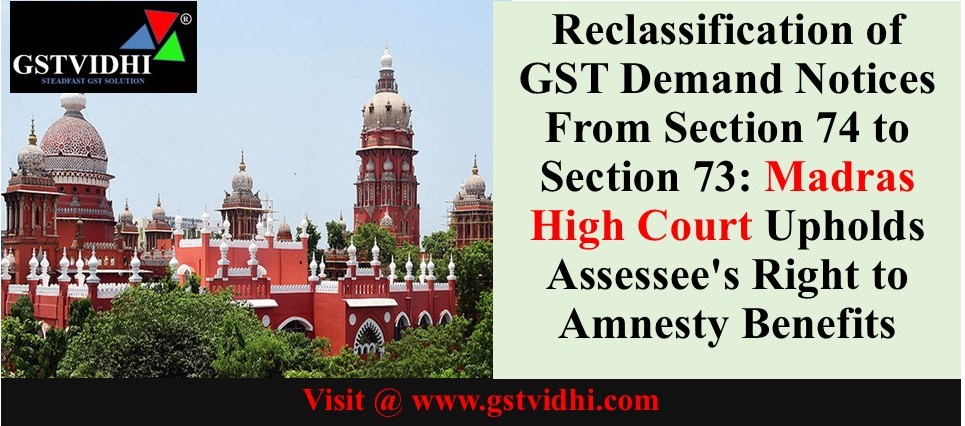
M/s Agni Estate Foundations Private Ltd. vs. State Tax Officer
Name of the Party:
M/s Agni Estate Foundations Private Ltd.
Case No.: W.P.Nos.9071, 9075 & 9080 of 2025
Date of Order: 19.03.2025
Court Name: High Court of Judicature at Madras
Presiding Judge: Hon'ble Mr. Justice Krishnan Ramasamy
Summary of the Case
This case pertains to a
dispute regarding the issuance of demand orders under Section 74 of the Central
Goods and Services Tax (CGST) Act, 2017, instead of Section 73. M/s Agni Estate
Foundations Private Ltd. contended that the ingredients necessary for invoking
Section 74 were absent, and thus, the notices should have been issued under
Section 73. The petitioner argued that this misclassification deprived them of
the benefits available under the Amnesty Scheme. The Madras High Court ruled in
favor of the petitioner, directing the demand orders to be treated as notices
under Section 73.
Facts of the Case
M/s Agni Estate
Foundations Private Ltd., a real estate firm registered under the CGST Act, was
subjected to an inspection of its financial records for the financial years
2017-18, 2018-19, and 2019-20 under Section 67 of the Act. Following the
inspection, the tax authorities issued show cause notices (SCNs) dated
24.07.2024, 29.07.2024, and 30.07.2024, under Section 74 of the CGST Act.
The petitioner responded
by arguing that there was no element of suppression, misstatement, or fraud in
their tax filings and that all due taxes had been paid and declared in their
GSTR-9 and GSTR-9C filings. They requested the authorities to treat the notices
under Section 73 instead of Section 74. However, despite their objections, the
authorities proceeded with demand orders (DRC-07) under Section 74 on
29.01.2025.
Submissions by the
Petitioner
The petitioner,
represented by Mr. Hari Radhakrishnan, made the following submissions:
- The petitioner had already discharged
the entire tax liability for the relevant years, which was duly reflected
in their annual GST returns (GSTR-9 and GSTR-9C).
- The notices under Section 74 were
unwarranted as there was no suppression, fraud, or misstatement.
- Under the Amnesty Scheme introduced
under Section 128A of the CGST Act, assessees were eligible for a waiver
of interest and penalties if tax liabilities had been paid in full before
a specified date.
- By issuing notices under Section 74,
the authorities deprived the petitioner of the Amnesty Scheme benefits.
- The authorities should have invoked
Section 73 instead, as it applies to cases where tax was not paid
correctly without fraudulent intent.
Submissions by the
Respondent
The respondents,
represented by Mr. C. Harsha Raj, Special Government Pleader (Taxes), made the
following arguments:
- The SCNs were issued under Section 74
based on the initial assessment by the department.
- The petitioner had contested the
classification of the proceedings under Section 74 and requested a
reclassification under Section 73.
- The tax authorities lacked the
jurisdiction to change the classification of the proceedings once issued.
- However, if the court deemed it
appropriate, they had no objection to treating the notices under Section
73 instead of Section 74.
Findings and Judgment of
the Court
Upon hearing both
parties, the court made the following observations:
- A critical examination of the SCNs
showed no mention of suppression of facts, fraud, or misstatement by the
petitioner.
- The essential requirements for
invoking Section 74 were absent in this case.
- The authorities had proceeded
mechanically without properly analyzing the facts and applying their
minds.
- Issuing notices under Section 74
unjustly deprived the petitioner of the Amnesty Scheme’s benefits.
- The appropriate course of action
would be to treat the SCNs and subsequent demand orders as if they were
issued under Section 73 instead of Section 74.
Judgment:
The court ruled in favor of the petitioner and held that the demand orders
issued under Section 74 shall be deemed to have been issued under Section 73.
This allowed the petitioner to avail itself of the Amnesty Scheme. The writ
petitions were accordingly disposed of without any costs.
Conclusion
This case highlights the
importance of correctly classifying tax notices under the appropriate sections
of the CGST Act. The ruling reinforces that tax authorities must apply their
minds before invoking Section 74, which carries stricter consequences. The
decision is significant for taxpayers as it upholds their right to avail
themselves of beneficial schemes like the Amnesty Scheme, ensuring that
procedural lapses by tax authorities do not result in undue hardships. By
allowing the reclassification of the proceedings under Section 73, the Madras
High Court has provided relief to the petitioner while setting a precedent for
future cases involving similar disputes.
Disclaimer: All the Information is based on the notification, circular and order issued by the Govt. authority and judgement delivered by the court or the authority information is strictly for educational purposes and on the basis of our best understanding of laws & not binding on anyone.
Find the Attachment (Press on Click Here )
Click here